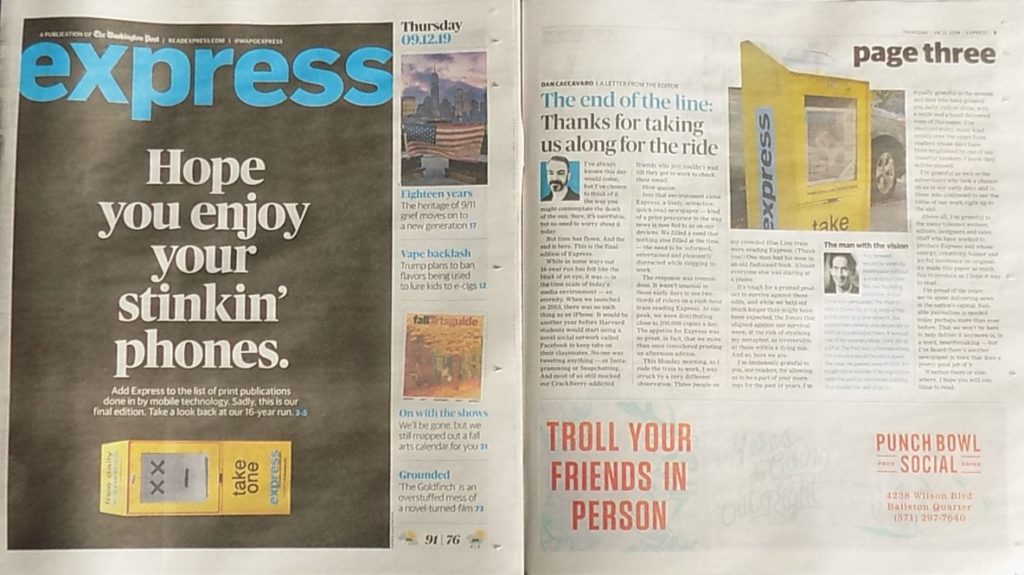Washington Post Express Takes Its Last Ride
By • September 12, 2019 0 1177

Express, the tabloid newspaper created by the Washington Post in 2003 as a commuter quick-read, published its final issue today, Sept. 12.
The Washington Post made the sudden announcement of the Express’s demise the day before, Sept. 11. Express employees have been fired.
The announced read, in part: “The Washington Post will publish the last edition of its Express commuter paper as of Thursday, September 12. Express has been an integral part of the morning commute for Washingtonians — a lively, highly engaging publication that has served Washington’s Metro riders for years. With the growth of WiFi in Washington’s Metro system, The Post can now serve those readers in ways that couldn’t have been imagined when it launched 16 years ago. More and more readers are consuming The Post’s content digitally, and The Post will continue to serve those who commute via Metro with digital products, including its mobile site, apps, newsletters and podcasts.”
Falling circulation and declining ad dollars were cited by some Post managers, according to the Post’s Paul Farhi, who wrote: “Colorful and lively, Express was designed to be a fast read for public-transit commuters each morning, especially people who didn’t subscribe to The Post. It featured eye-catching and sometimes cheeky cover illustrations that highlighted a single news story or trend, often one underplayed by The Post or ignored by TV newscasts. It also contained a mix of news stories and features drawn from The Post and original stories and opinion columns produced by its own staff, now numbering 20 journalists. They will be laid off as a result of the paper’s closure.”
The Washington Post Newspaper Guild criticized the sudden closure of Express and asked for its employees to hired by the parent newspaper: “These employees, many of them young women, performed the same jobs as other staff in our newsroom for substantially lesser pay … They were excluded from a union contract that would have protected them only by legal and bureaucratic fictions that labeled them a different entity within our company, though Post Express and The Washington Post are both owned by Jeff Bezos, the richest person in the world.”
Dan Caccavaro, founding editor of Express, wrote his last letter from the editor, centering on the advent of iPhones as the death knell for the tabloid. “I’ve always known this day would come, but I’ve chosen to think of it the way you might contemplate the death of the sun. Sure, it’s inevitable, but no need to worry about it today … This Monday morning, as I rode the train to work … three people on my crowded Blue Line train were reading Express (Thank you!). One man had his nose in an old-fashioned book. Almost everyone else was staring at a phone. It’s tough for a printed product to survive against those odds. … Reliable journalism is needed today perhaps more than ever … I hope you continue to read.”

